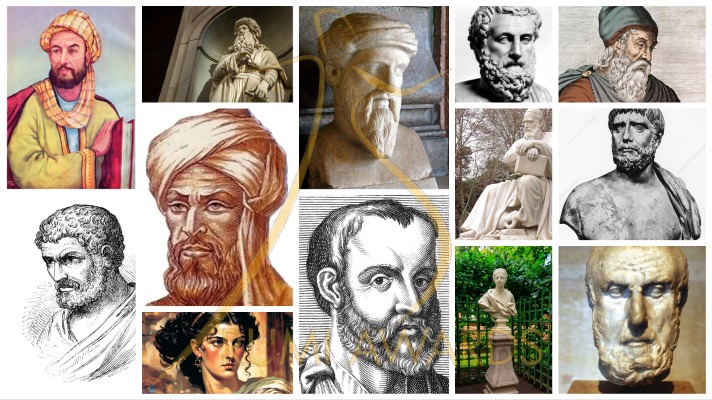The Top Ten Ancient Scientists Who Changed the World
1. Aristotle: Aristotle was a Greek philosopher and scientist who lived in the 4th century BC. He is widely considered to be one of the most influential figures in the history of science. He made significant contributions to the fields of physics, biology, zoology, metaphysics, logic, and ethics. He is also credited with developing the foundations of modern scientific thought.
2. Archimedes: Archimedes was a Greek mathematician, physicist, and engineer who lived in the 3rd century BC. He is best known for his work on the principles of buoyancy and hydrostatics, as well as his invention of the Archimedes screw. He is also credited with developing the foundations of calculus and the use of infinitesimals.
3. Hippocrates: Hippocrates was a Greek physician who lived in the 5th century BC. He is widely considered to be the father of modern medicine. He is credited with developing the Hippocratic Oath, which is still used today by medical professionals. He is also credited with developing the foundations of medical ethics and the scientific method.
4. Euclid: Euclid was a Greek mathematician who lived in the 4th century BC. He is best known for his work on geometry, which is still used today. He is also credited with developing the foundations of number theory and mathematical proof.
5. Ptolemy: Ptolemy was a Greek astronomer and mathematician who lived in the 2nd century AD. He is best known for his work on the geocentric model of the universe, which was widely accepted until the 16th century. He is also credited with developing the foundations of trigonometry and the use of the equatorial coordinate system.
6. Galen: Galen was a Greek physician who lived in the 2nd century AD. He is best known for his work on anatomy and physiology, which is still used today. He is also credited with developing the foundations of pharmacology and medical experimentation.
7. Avicenna: Avicenna, also known as Ibn Sina, was a philosopher and physician from ancient land now called Afghanistan & Iran who lived in the 10th century AD. He is best known for his work on medicine, which is still used today. He is also credited with developing the foundations of modern scientific thought and the use of scientific method.
8. Al-Khwarizmi: Al-Khwarizmi was a Persian mathematician and astronomer who lived in the 9th century AD. He is best known for his work on algebra, which is still used today. He is also credited with developing the foundations of trigonometry and the use of the decimal system.
9. Omar Khayyam: Khayyam known for his contributions to mathematics, astronomy, philosophy, and poetry. As a mathematician, he is most notable for his work on the classification and solution of cubic equations, where he provided geometric solutions by the intersection of conics. Khayyam also contributed to the understanding of the parallel axiom. As an astronomer, he calculated the duration of the solar year with remarkable precision and accuracy, and designed the Jalali calendar, a solar calendar with a very precise 33-year intercalation cycle that provided the basis for the Persian calendar that is still in use after nearly a millennium.
10. Leonardo da Vinci: Leonardo da Vinci was an Italian polymath who lived in the 15th century AD. He is best known for his work on painting, sculpture, and engineering, which are still used today. He is also credited with developing the foundations of modern scientific thought and the use of scientific method.
Exploring the Contributions of the Top Ten Ancient Scientists

The contributions of the top ten ancient scientists have been instrumental in the development of modern science. From the development of mathematics to the understanding of the natural world, these scientists have left an indelible mark on the history of science.
The first of the top ten ancient scientists is Thales of Miletus. He is credited with being the first to use deductive reasoning to explain natural phenomena. He is also credited with being the first to use geometry to measure the height of pyramids and the distance of ships from the shore.
The second of the top ten ancient scientists is Pythagoras. He is credited with being the first to develop the Pythagorean theorem, which is still used today in mathematics. He is also credited with being the first to develop the concept of musical harmony.
The third of the top ten ancient scientists is Aristotle. He is credited with being the first to develop a comprehensive system of logic and scientific inquiry. He is also credited with being the first to develop the concept of the four elements.
The fourth of the top ten ancient scientists is Euclid. He is credited with being the first to develop a comprehensive system of geometry. He is also credited with being the first to develop the concept of the prime number.
The fifth of the top ten ancient scientists is Archimedes. He is credited with being the first to develop the concept of the lever and the pulley. He is also credited with being the first to develop the concept of the Archimedes screw.
The sixth of the top ten ancient scientists is Avicenna. Avicenna is regarded as one of the most significant physicians, astronomers, philosophers, writers and the father of early modern medicine. He is also credited with being the first to develop the concept of the scientific method.
The seventh of the top ten ancient scientists is Ptolemy. He is credited with being the first to develop a comprehensive system of astronomy. He is also credited with being the first to develop the concept of the geocentric universe.
The eighth of the top ten ancient scientists is Galen. He is credited with being the first to develop a comprehensive system of medicine. He is also credited with being the first to develop the concept of the four bodily humors.
The ninth of the top ten ancient scientists is Omar Khayyam. Khayyam known for his contributions to mathematics, astronomy, philosophy, and poetry.
As a mathematician, he is most notable for his work on the classification and solution of cubic equations, where he provided geometric solutions by the intersection of conics. Khayyam also contributed to the understanding of the parallel axiom. As an astronomer, he calculated the duration of the solar year with remarkable precision and accuracy, and designed the Jalali calendar, a solar calendar with a very precise 33-year intercalation cycle that provided the basis for the Persian calendar that is still in use after nearly a millennium.
The tenth of the top ten ancient scientists is al-Khwarizmi. He is credited with being the first to develop a comprehensive system of mathematics. He is also credited with being the first to develop the concept of algebra.
The contributions of these top ten ancient scientists have been instrumental in the development of modern science. From mathematics to medicine, these scientists have left an indelible mark on the history of science.
Uncovering the Lives and Legacies of the Top Ten Ancient Scientists
The ancient world was a time of great scientific discovery and advancement. From the development of mathematics to the study of astronomy, the ancient scientists of the past have left a lasting legacy on the world. Here, we will explore the lives and legacies of the top ten ancient scientists.
1. Archimedes of Syracuse (287-212 BC): Archimedes was a Greek mathematician, physicist, engineer, and astronomer. He is best known for his work on hydrostatics, which led to the development of the Archimedes’ Principle. He also made significant contributions to the fields of mathematics, mechanics, and optics. His legacy is still felt today in the form of the Archimedes’ Screw, a device used to lift water from low-lying areas.
2. Hippocrates of Cos (460-370 BC): Hippocrates was a Greek physician and is considered to be the father of modern medicine. He is best known for his Hippocratic Oath, which is still used today by medical professionals. He also made significant contributions to the fields of anatomy, physiology, and pharmacology. His legacy is still felt today in the form of the Hippocratic Corpus, a collection of medical texts that are still used in medical education.
3. Euclid of Alexandria (325-265 BC): Euclid was a Greek mathematician and is best known for his work on geometry. He is credited with the development of the axiomatic method, which is still used today in mathematics. His legacy is still felt today in the form of Euclidean geometry, which is still used in mathematics and engineering.
4. Ptolemy of Alexandria (90-168 AD): Ptolemy was a Greek astronomer and mathematician. He is best known for his work on the geocentric model of the universe, which was accepted as the standard model for centuries. He also made significant contributions to the fields of mathematics, optics, and astrology. His legacy is still felt today in the form of the Ptolemaic system, which is still used in astronomy and navigation.
5. Aristotle of Stagira (384-322 BC): Aristotle was a Greek philosopher and scientist. He is best known for his work on logic, which is still used today in philosophy and mathematics. He also made significant contributions to the fields of biology, physics, and metaphysics. His legacy is still felt today in the form of the Aristotelian system, which is still used in philosophy and science.
6. Avicenna: Avicenna, also known as Ibn Sina, was a philosopher and physician from ancient land now called Afghanistan & Iran who lived in the 10th century AD. He is best known for his work on medicine, which is still used today. He is also credited with developing the foundations of modern scientific thought and the use of scientific method.
7. Thales of Miletus (624-546 BC): Thales was a Greek philosopher and mathematician. He is best known for his work on geometry, which led to the development of the first deductive system of mathematics. He also made significant contributions to the fields of astronomy, engineering, and philosophy. His legacy is still felt today in the form of the Thales’ Theorem, which is still used in mathematics and engineering.
8. Hypatia of Alexandria (370-415 AD): Hypatia was a Greek philosopher and mathematician. She is best known for her work on mathematics, which led to the development of the first algebraic system. She also made significant contributions to the fields of astronomy, philosophy, and theology. Her legacy is still felt today in the form of the Hypatia’s Theorem, which is still used in mathematics and engineering.
9. The ninth of the top ten ancient scientists is Omar Khayyam. Khayyam known for his contributions to mathematics, astronomy, philosophy, and poetry.
As a mathematician, he is most notable for his work on the classification and solution of cubic equations, where he provided geometric solutions by the intersection of conics.
10. The tenth of the top ten ancient scientists is al-Khwarizmi. He is credited with being the first to develop a comprehensive system of mathematics. He is also credited with being the first to develop the concept of algebra.
The lives and legacies of these ten ancient scientists have had a lasting impact on the world. From mathematics to medicine, their contributions have shaped the way we think and live today. We owe them a great debt of gratitude for their pioneering work and dedication to science.


